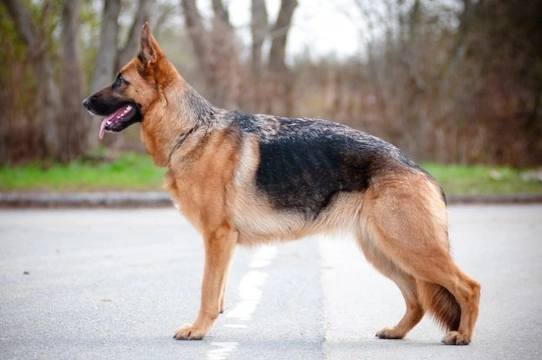
Some informative facts about the German Shepherd dog
The German Shepherd dog, previously known as the Alsatian, is loyal, intelligent and very protective large dog breed that is also incredibly personable, entertaining and fun to have around. The German Shepherd is one of the most popular dog breeds in the UK, and has stayed steadily within the top ten list of our favourite pedigree dogs for many years now, making them one of the most commonly seen large breeds in the UK.
If you are considering adding a German Shepherd dog to your family and want to find out more about this large, active breed, it is important to do your research first! In this article, we will introduce to you some informative facts about the breed to get you started.
A short history of the German Shepherd dog
The German Shepherd dog originates from Germany, as the name suggests! The breed’s origins consist of a combination of the old Germanic farm dogs and herding breeds that were native to the country at the time, and the breed as we know it today was first introduced to the world in 1899, when breeder Max Von Stephanitz showed his first specimens.
The breed was specifically developed to have superior instincts for guarding and herding, and later, personal and property protection and tracking. The German Shepherd is popular across the world, and can commonly be seen in working roles including alongside of the police and military, and in some areas, as farming and livestock guarding dogs.
The breed fell out of favour within the UK around the advent of the Second World War, as the popularity of all things German fell sharply, and the idea of owning a dog with German origins was largely considered to be unpatriotic. After the war, the breed tended to be known as the Alsatian rather than the German Shepherd, in order to attempt to disassociate the breed in people’s minds with the German nation. The breed has undergone a huge resurgence in popularity over the last fifty years, thanks to their extreme versatility, high levels of intelligence and positive personality traits.
What should the German Shepherd temperament be like?
The German Shepherd breed standard calls for a fearless, confident and protective dog, that can keep their calm in the midst of stressful situations and follows commands reliably every time.
They are also renowned for their loyalty, the close bonds that they form with their families, and their naturally protective instincts. They make excellent guard dogs, and can be rather aloof with strangers. They are often rather dominant dogs, and so adequate socialisation and good training are essential to keep them under control and able to interact properly with other dogs.
Appearance and breed traits
The German Shepherd is classed as a large breed dog, weighing up to 90lb for males and standing up to around 25” tall at the shoulder. They should be muscular but not fat, agile, and have a longer body length than their height. They generally have medium length coats, although long-coated varieties can also be seen, and their fur is thick and double-layered. Breed standards accept a German Shepherd in the traditional black and tan, all black, and a variety of other shades, although white German Shepherds, while often in great demand, do not meet the breed standard.
The average lifespan of the German Shepherd is 12-13 years, and the breed as a whole tends to be robust and healthy. However, there are some breed-specific health issues and inheritable problems to be on the lookout for, such as hip dysplasia and a predisposition to bloat or GDV.
The German Shepherd’s care requirements
While the German Shepherd can and does fit well into a wide range of roles, such as being a working dog, a family pet or the companion of a lone older person, they should not be considered to be one of the more low-maintenance breeds to care for.
While they can be happy living in smaller homes or apartments, they are very energetic dogs that need several long walks per day, and plenty of time spent off the lead to really be happy. Due to their high intelligence, ensuring sufficient mental stimulation for your dog is also essential, and they should not be left alone for long periods of time, otherwise they will soon become bored and destructive.
Due to their long, thick coats, German Shepherds do also require a reasonable amount of grooming, and should be brushed and combed out several times a week to keep their coats in good condition. They also tend to moult heavily twice a year or so, so investing in a sturdy hoover is important too!
The German Shepherd needs a confident, competent trainer that knows what they are doing, so a German Shepherd might not be the ideal choice for your first dog unless you are prepared to spend a long time researching the best way to train them first, or have an experienced trainer to hand. Finally, the natural guarding instincts of the German Shepherd can cause them to become overly defensive or territorial of your home, something that it is important to keep in check.



